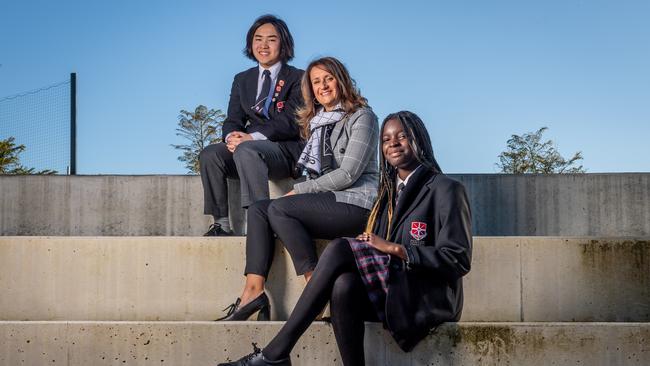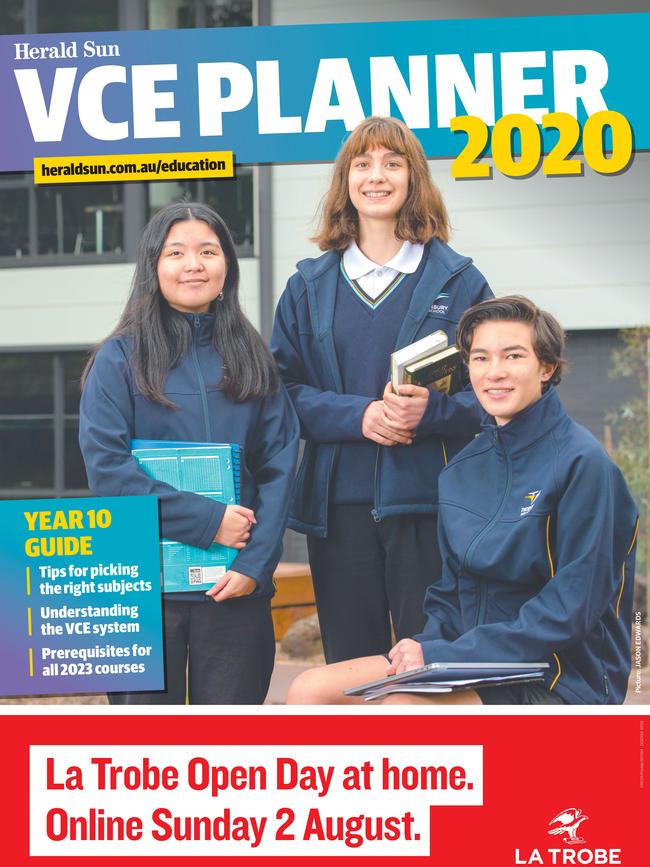VCE planner for Year 10 students: How to choose Year 11 and 12 subjects
Picking the best subjects to study in VCE is crucial for Year 10 students — and the task may be even more daunting in this rollercoaster year. Get expert tips on how to get it right, plus the full list of prerequisites for all 2023 courses.

Advice
Don't miss out on the headlines from Advice. Followed categories will be added to My News.
Year 10 students across Victoria are deciding which subjects to study during their last years at school.
For many, deciding which of the more than 90 VCE subjects to choose from will be fairly straightforward.
Others may decide that their final few years of school won’t involve VCE but will take a more hands-on and vocational pathway.
But not knowing what you want to do with the rest of your life when you are in Year 10 is pretty common, and it’s also normal to feel some uncertainty and stress about choosing the subjects to study for the last two years of school.
“Students can feel a little pressure around this time. Some students are clear about where they want to go but the majority are probably uncertain about where they want to head in the future — and that’s totally OK,” says Beyond Blue lead clinical adviser Dr Grant Blashki.
“Some students may think, ‘if I don’t choose the right thing it will have a big impact on my life’. Or ‘I don’t even know what I want to do next week, let alone next year or for the rest of my life’. Turn down the volume on the stress and keep perspective.”
The second COVID-19 lockdown has seen many Year 10 students return to remote learning, which may also throw a spanner in the works.
“Understand that it may take a while to warm up to school life again and that may mean it takes you a little longer to decide what subjects you want to choose,” says Dr Blashki.
Caroline Chisholm Catholic College careers co-ordinator Julie Pilioglou says by Year 10 many students have also had a taste of a wide range of subjects so are developing ideas about what subjects inspire and interest them.
And while some have their sights set on university, there are many pathways to follow in the final few years of school and beyond.
School information about VCE, VCAL and VET programs, university course guides and VTAC’s online resources are designed to help students narrow down their choices.
“It’s all about understanding the student and finding the right program for them,” she says.
KEY TIPS FOR STUDENTS

DON’T PANIC
The study choices you make now are not permanently binding, and you will probably make several different work and career choices throughout your life.
“This is not an all or nothing moment. It is just part of the journey,” Dr Blashki says.
Know that it’s OK to not have a path mapped out and to be unsure what you want to do after school.
There will also be some flexibility about what you study in Years 11 and 12 — you can make some changes along the way.
DO YOUR RESEARCH
Gather as much information as possible about your options and then sift through the details.
“Universities will have prerequisites so have you researched those courses and the industries that you are interested in working in? What subjects do they recommend?” says Ms Pilioglou.
Attend university open days if you can (many are holding virtual events), look at the VTAC CourseSearch and speak to your teachers about the subjects you might be interested in to find out what you will cover in Year 11 and 12, too.
There’s no point choosing studies that aren’t available to you, so check out the VCE studies that your school offers, and whether or not it’s possible to study individual studies at any other school.
IT’S YOUR CHOICE
The VCE subjects you choose are a personal decision and require you to think carefully about what you are good at, what you are interested in, and what you might like to study after school.
It’s a good idea to speak to teachers, friends and family about their experiences and what they think you are good at — but ultimately, the decision should be yours.
FOLLOW YOUR INTERESTS
Pick subjects you enjoy, you are confident in and give you energy and motivate you.
“Don’t be too distracted by other people’s expectations, or by picking subjects that get marked up,” suggests Dr Blashki.
“The successful completion of any Year 12 program is to do something you enjoy,” says Ms Pilioglou.
UNSURE? KEEP IT BROAD
If you have no idea of what you want to do after school, keep your VCE study program broad with studies across the areas that you are interested in and good at. Don’t choose studies if you don’t like them or aren’t good at them.
CONSIDER YOUR VCE WORKLOAD
Look for balance and think about the workload implications of your subject selection.
“If you choose a few subjects with heavy workloads, pick some subjects that are lighter to leave room for hobbies, friends, exercise and looking after yourself,” Dr Blashki says.
A ‘GOOD’ ATAR?
The ATAR is a rank, not a score, and there is no pass or fail mark. If you get an ATAR of 50 it means you have performed better than 50 per cent of the Year 12 age group. A “good” ATAR is the ATAR you need to get you into a course you want to do.
Choosing studies simply because of how they were scaled last year doesn’t guarantee you a “good” ATAR.
KEY TIPS FOR PARENTS
GUIDE KIDS TO THEIR DECISION
Parents can support students by asking what they are interested in and listening to what they might be worrying about in terms of subject choices.
Ms Pilioglou says while parents are an important sounding board, ultimately the choices should be left to their child.
“Parents need to be good listeners and to give their child some flexibility in making their decisions about subjects,” she says.
“Some parents will be quite strong in what they want their child to do, but you can set them up for failure if a child chooses a subject they don’t want to do.”
KEEP THE PRESSURE DOWN
“Remind them that life is more than school subjects and performance. Be a haven where they can express what they are interested in, and turn down the worry by reminding children they are just testing the water now,” says Dr Blashki.
“Parents may have certain qualifications and that became their career for life. That’s changed. Kids are now more agile and won’t have a linear career.”
PUT THINGS INTO PERSPECTIVE
Concerns about the recent spike in COVID-19 cases may also trigger some anxiety at a time when students feel the responsibility of choosing subjects for next year.
“Parents can be honest about what is happening with the pandemic but emphasise that while this time is difficult, it is temporary. There will be a vaccine and we will get back on track and come out the other side of this,” Dr Blashki says.
MORE EDUCATION NEWS
MELBOURNE GRAMMAR KEEPS UP DISCOUNTS AFTER SCHOOLS BACKFLIP
PARENTS’ GUIDE TO REMOTE LEARNING 2.0
DOWNLOAD OUR VCE GUIDE FOR YEAR 10 STUDENTS: Get the prerequisites for all 2023 courses | Expert tips for subject selection | Understanding the VCE system
How to download your VCE Planner to print at home:
Click the link above
Once the poster has opened, right click the poster
Save to your computer
Print at home
